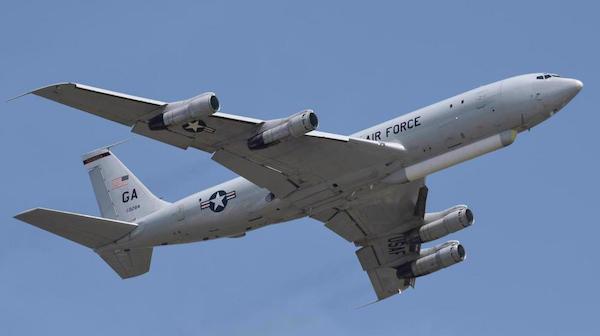
The second overflight was carried out on Thursday morning to gather intelligence about the Russian military situation on the ground. (Photo by US Air Force)
Amid heightened tensions, the US Air Force flew a second spy aircraft over eastern Ukraine hours before the telephonic conversation between Russian President Vladimir Putin and his US counterpart Joe Biden on Thursday.
According to a report in CNN, citing sources, the overflight was carried out on Thursday morning to gather intelligence about the Russian military situation on the ground.
The US Air Force flew another spy plane over eastern Ukraine on Thursday morning to gather intel about the Russian military situation on the ground, per source. It was the second time this week that the US carried out such a mission & came just hours before Bidenís call w/Putin.
— Natasha Bertrand (@NatashaBertrand) December 30, 2021
Earlier on Wednesday, citing European Command (EUCOM) spokesperson Lt. Cmdr. Russ Wolfkiel, CNN reported that the US spy plane JSTARS E-8 had conducted its first flight over eastern Ukraine.
Wolfkiel said the US "routinely operates aircraft in the Black Sea region in support of various US and coalition intelligence objectives," without revealing the exact route of the aircraft and details of the intelligence gathered during the flight.
The developments come amid heightened tensions between Moscow and Washington over Ukraine.
Western countries accuse Russia of making preparations for a potential invasion of Ukraine by amassing troops near the border with the country.
Moscow has dismissed the allegations, saying it is entitled to move its military freely within its borders and that it is taking precautionary measures because of the increased NATO activity near its borders.
In his 50-minute telephonic conversation with Biden, the Russian leader Russian said Moscow requires legally binding agreements on security guarantees, according to Kremlin aide Yuri Ushakov.
"Vladimir Putin outlined in detail the basic principles that were put in the documents we handed over, and stressed that negotiations on these three tracks are important for us [bilateral talks in Geneva, Russia-NATO council in Brussels, and OSCE summit in Vienna]," Ushakov was quoted as saying by Sputnik.
"But the main thing is that we need a result, and we will achieve a result in the form of ensuring the guaranteed security of Russia," Ushakov asserted. "Biden has clearly said that the United States is not going to deploy offensive strike weapons to Ukraine."
Meanwhile, in an article published by the US media outlet ‘Foreign Policyí on Thursday, Russian Ambassador to the US, Anatoly Antonov, termed NATOís attempts to move closer to the Russian border as "extremely dangerous."
Moscow, the envoy warned, will be forced to create vulnerabilities against the alliance if it continues to build its military presence in the region.
"The situation is extremely dangerous," Antonov wrote. "No one should doubt our determination to defend our security. Everything has its limits. If our partners keep constructing military-strategic realities imperiling the existence of our country, we will be forced to create similar vulnerabilities for them."
He further stressed that Russia has come to a point where it has no way to retreat, calling the military exploration of Ukraine by NATO countries an existential threat to Russia.
"Urgent action is needed. The principle of equal and indivisible security must be restored. This means that no single state has the right to strengthen its security at the expense of others. With political will, this can be achieved through the development of serious long-term and legally binding security guarantees, he noted, adding that the European security was now "at a crossroads."
American and Russian officials are expected to hold formal talks on January 10 to discuss European security and simmering tensions over the Ukraine conflict.
Earlier this month, Russia revealed a list of security proposals it had pitched to the US, including an undertaking that NATO would give up any military activity in Eastern Europe and Ukraine.
LINK: https://www.ansarpress.com/english/25463
TAGS:






























 online news tv
online news tv




